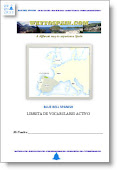If we just want to have a broad idea on how to communicate in Spanish at a basic level of identifying ourselves and our immediate surroundings, asking for plain food items, doing some shopping and having some words to work our way around directions, then yes, we have a more or less good chance to get what we need out of the Internet, provided that we spend some time surfing doing a little research on what is available, and what suits us best.
If we are looking for games, activities and music to supplement and encourage our kids learning of Spanish, then the above conditions will apply too: hours of thorough surfing, searching and researching, and then choosing what we find most appropriate.
But, if we are looking to provide our kids with a solid foundation in Spanish, if we are seeking to give them a comprehensive approach incorporating grammar, vocabulary, culture, practice, writing, reading and speaking, in other words, if we want to give them a true education, then we are going to need some additional help with the Internet. If we want to count with the accumulated work and expertise of a team of applied linguists and educational designers, that spend thousands of hours putting together appropriate vocabulary in context that builds upon itself by recycling words in strategic ways, with a productive incorporation and explanation of grammar, as well as facilitating study guidelines, speaking, reading and writing skills, and finally a self-evaluation plan that can adequately indicate what needs improvement, then Internet can be the optimum choice to provide students at home with an efficient and appropriate Spanish program. If we want to offer our kids the best possible education in Spanish, then Internet can help us find a program such as that one as well: BlueBell Spanish.
Hasta pronto!!

